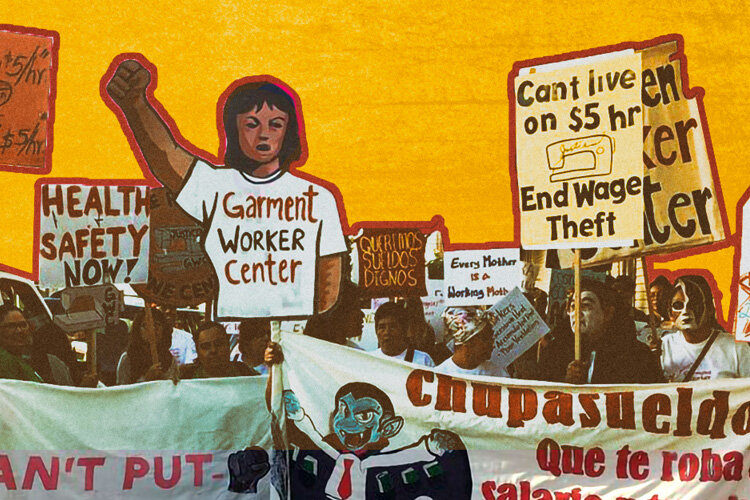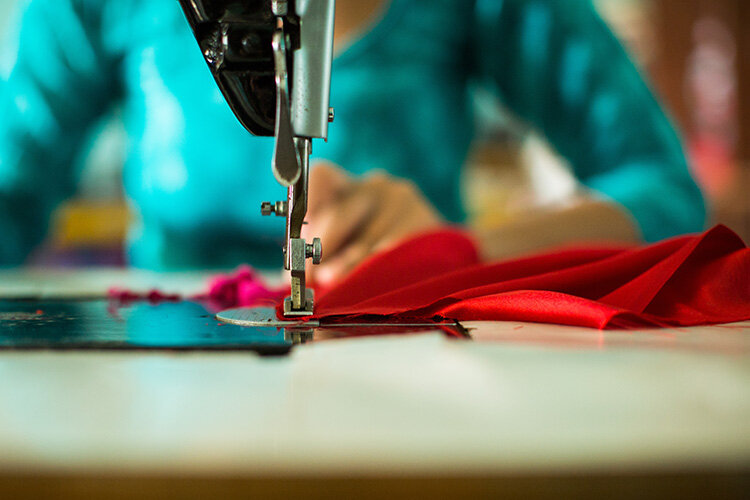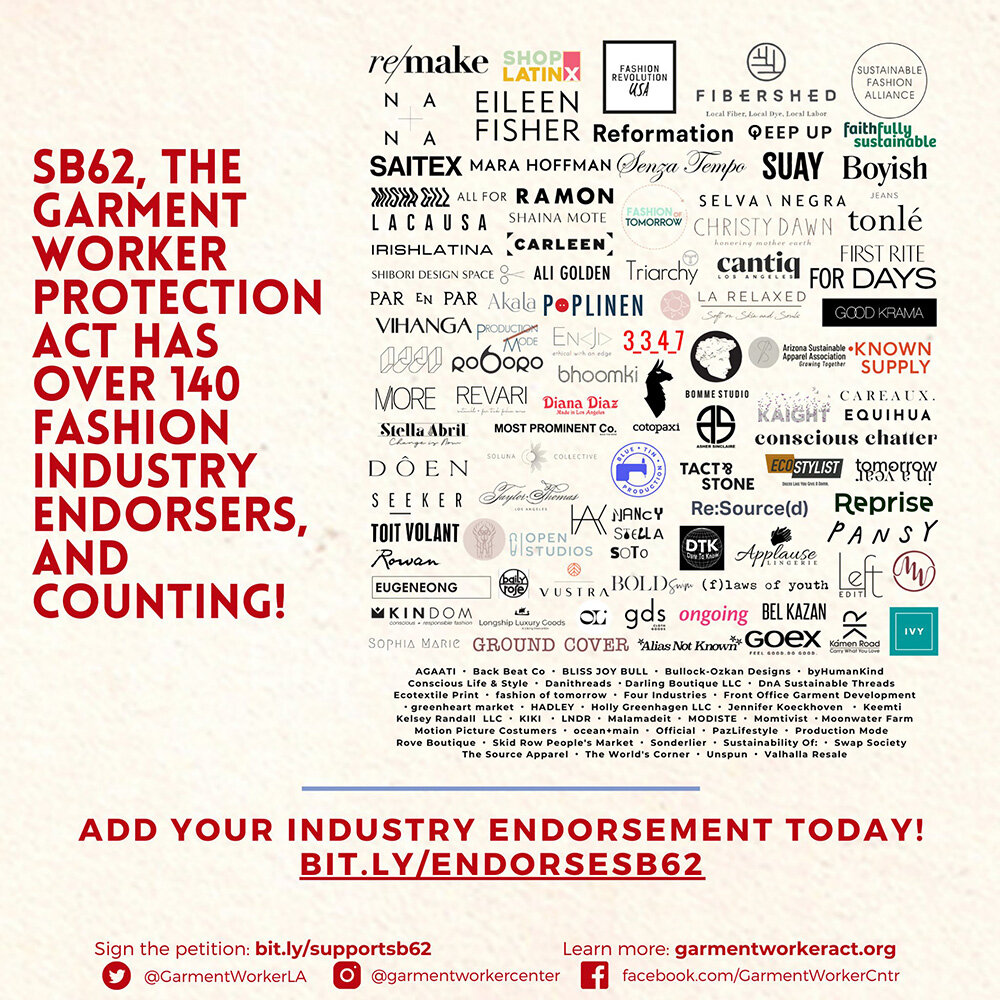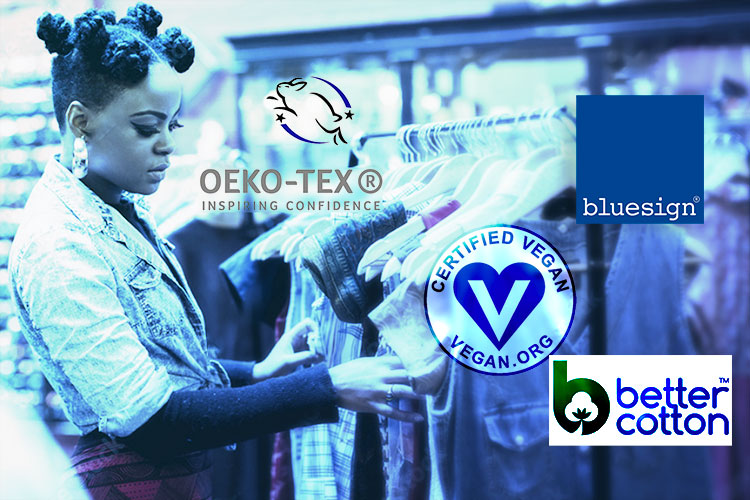LA has become the epicenter of worker’s rights in the US. Img of garment workers demanding fare wages.
A race to the bottom – what’s that about? Profit, plain and simple. And ultimately, it’s the clearest metaphor of fast fashion that we have. We get to buy tons and tons of cheap, disposable stuff which somehow satisfies our need for the ever new. But what about true cost? Here at No Kill, we often bring that into the conversation. And the true cost, as most of us know by now, is that the only real way the big profits roll in to the worst of the worst brands is by slave labor. But usually it’s happening somewhere else, over there, on the other side of the Pacific or in the sub-Continent or Africa.
How about home-grown slave labor in la la land? Possible? Sure. In fact, the garment workers of southern Cal have been working overtime. But by mid-August, garment workers in California could be one step closer to better protections and safer work environments if SB62 (the Garment Worker Protection Act) moves onto the desk of Governor Gavin Newsom. The law will help close the gaps in California labor laws that leave workers unpaid, making less than the state’s minimum wage all while in unsafe conditions.
Workers in the California garment industry are still often paid through a piece-rate system, which can change on a whim. The piece-rate can be as little as 2 cents per piece. Garment workers who are paid by piece-rate are usually paid less than $6 per hour for their efforts and as low as $3 per hour depending on piece-rates, according to a study by UCLA.
Big name fashion brands know what they are doing. They pay subcontractors rates that are so low that workers end up paying the price for cheap clothing. The Garment Worker Protection Act would eliminate the piece-rate system in the garment industry, which is too often used as a cover to pay wages less than the minimum wage, and it would create multi-lateral accountability
Last week Remake held a press conference with some key voices in the fashion industry to discuss the power of this bill and what it would mean for the future of fashion, including: Carrie Freiman, Director of Sustainability of Reformation, Sanjeev Bahl, Founder of Saitex, one of the world’s most sustainable denim mills and moderated by both Ayesha Barenblat, Founder of Remake and Elizabeth L. Cline, Author and Advocacy and Policy Director of Remake and the PayUp Fashion Coalition Coordinator.
What did we learn? To start, there are still sweatshops in California. Yes, you read that right. California’s apparel industry also happens to be the largest in the United States with over 46,000 garment workers and over 4,000 manufacturers. Having higher standards for factories and upholding workers’ rights here would definitely have a domino effect.
““We want to see the United States become a leader in ethical, sustainable business. Right now we’re reflecting views that haven’t been popular for decades,””
One of the reasons the bill has taken so long to be voted on is because of the lack of media coverage. Propaganda that SB62 is a “job killer” or costing “too much” money for taxpayers run rampant with no facts to counter it. Its passage will actually help to keep garment workers at their jobs longer. As for the money, it’s time we get real about production costs.
“For those who keep talking about cost, they need to start putting it into perspective and start looking at it from a productive and efficient standpoint of a business rather than marginalizing labor and blaming labor for the expensive costs that they accumulate,” said Saitex founder Sanjeev Bahl.
As Bahl said at the event, the arguments against SB62 are “superficial and unjustifiable” and we agree!
Here are some ways to get involved to help protect garment workers and get this bill passed.
Contact Governor Newsom’s office.
Send him an email or make a phone call at (916)-445-2841. Let him and his team know that people, even outside of California, we care about this bill and what it would mean for the future of fashion.
Stop shopping brands that don’t support their entire supply chain (and support the brands that do!).
As always, be mindful when you buy. Brands saying they can’t be responsible for what happens in factories that produce their clothing is like the Vatican saying they can’t be responsible for pedophile priests in the local parish. Stay up to date on how brands feel about bills like this and don’t be afraid to ask them about it. We’ve recently compiled a list of fast fashion brands to avoid and that’s a good place to start if you’re still shopping fast fashion. Also, according to the Garment Worker Center, Fashion Nova, Windsor, Forever 21, Harley Davidson, Lulu’s, Urban Outfitters, and Charlotte Russe are the brands that source in Los Angeles that are most responsible for driving down working conditions. (just sayin’) And check out the brands that DO support SB62 above!
Educate yourself on what’s going on inside fashion.
As much as we wish it weren’t true, the fact of the matter is we cannot trust our corporations to tell the truth. The only way this will change is to be aware of what’s going on and demand transparency. Being educated is a choice. If you can spend time researching websites for the best discount you can certainly use Google to find out what else is going on. It’s really easy to let matters like this pass you by, especially with little to no media coverage. However, the information is out there on pages like Remake …and No Kill! 😉 All you have to do is look.









